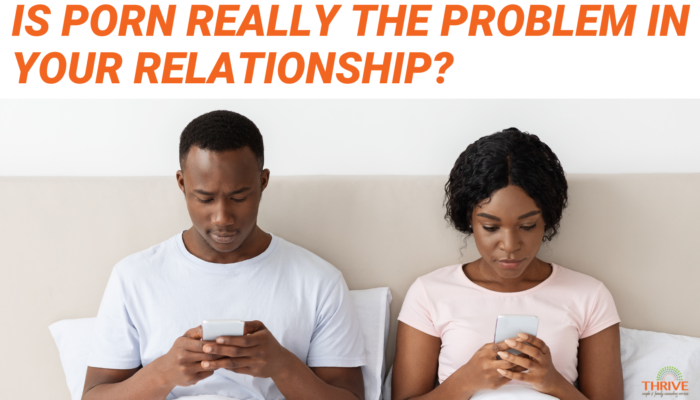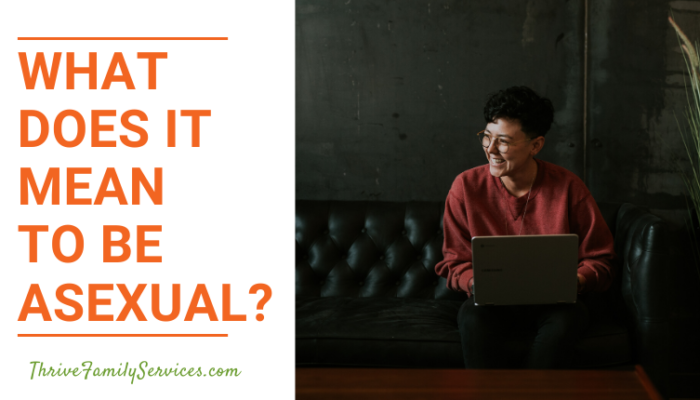In our society, porn is often considered a taboo subject.
Yet, we know that porn use is tens of thousands of years old and has been created and consumed all over the world. Studies generally seem to point to the increase in use, that a significant majority of American adults have viewed pornography at some point, and that a large percentage view it regularly.
We see it represented in the media as an indication of sexual deviance, often portraying the use of porn as secretive and shameful, or even as harmful to relationships. When we hear the word porn many of us have an image in our head of those participating being abused or taken advantage of.
But is porn really the problem?
Let’s introduce you to a fictional couple named Rachel and Henry.
Rachel came into their couples therapy session concerned with her partner Henry’s porn use. Rachel shared that she felt porn was causing problems in their intimacy. Rachel shared concern over how her body compared to those of the performers, as well as her fear of being unable to satisfy Henry sexually.
In exploring how Henry felt hearing this, he shared that he was very satisfied with the sex they have but felt a lot of pressure to perform and often felt he was failing Rachel if she did not experience orgasm. Henry reiterated that he was very attracted to his wife and did not think about anything related to porn when he was engaging with her intimately.
When asked how they talked about this at home, the resounding answer was “We don’t”. When asked about why this was a difficult topic to discuss, both partners shared how, in their own families of origin, sex was not discussed openly, and they had never experienced a partner asking them about what they wanted or desired in sex. Both partners shared it had always felt intimidating to explore sex and they were uncertain where to begin.
Talking About Porn or Sex Can Be Difficult
In this scenario, which is similar to many others brought into couple’s therapy, pornography really is not the problem. The shame and fear of discussing sex is the problem and porn is a convenient culprit.
When we go a little deeper, get a little more vulnerable, we can find that expressing yourself with your partner regarding your sexual desires, needs, or fantasies can feel daunting. Emotionally Focused Therapy (EFT) can help you understand you and your partner’s emotions regarding sex, and help you find a way to communicate and connect in new ways.
When Porn is a Problem
It is important to note that some religious belief systems prohibit or discourage pornography use, or consider it sinful or immoral, and any intimate relationship must respect the beliefs of both partners. If you or your partner are engaging in an act that feels incompatible with your beliefs, there is room to discuss this further in therapy to find a more shared experience and authentic way of engaging with sexuality that does not conflict with your faith.
In some religions, the marriage relationship is the only space in which explorations of sexuality are acceptable. We can respect this boundary and find a way to better engage in sexual exploration with your partner to ensure pornography does not create further disconnection in your relationship with your partner or with yourself.
The Role of Pornography in Sexual Intimacy and Sexuality
Depictions of the human body and sexual acts are embedded in our history, going back tens of thousands of years.
Sexuality exists on a spectrum. Pornography offers some people a chance to engage safely in their own pleasure without the pressure, expectations, or insecurities that engaging in sex with a partner might activate.
Porn can also provide a chance to expand and explore your sexual preferences or offer new ways of thinking about the sex you are having. It can be a form of self-care and release that does not have to be deviant.
So, when is porn a problem?
Simply put, pornography is a problem when it is being used at inappropriate times or in inappropriate places. Any sexual act should be one where every party is consenting and able to communicate their needs and wants.
When someone watches pornography in public or at work, those around us can no longer consent (even if you think no one can see you). It is also important to keep porn use minimal when minors are present in your household to ensure they do not have access or stumble across a caregiver engaging in pornography use.
If watching porn becomes a higher priority than your responsibilities as an adult, it allows you to avoid your reality. Avoidance of reality leads to avoidance of emotions, and this is often a sign that you are at capacity and need to reassess your life and where your energy is going. If porn is helping you avoid life, it is worth talking more in depth with a therapist on why this is happening and what you can do about it.
Unethical porn is real.
However, there is hope! Ethical porn can be found if you are able to put the time and energy into researching your sources. There are sex workers who truly enjoy what they do and make a substantial amount of money doing what they love. There are companies who seek out a diverse group of performers and can offer acts that are both fantasy and reality where pleasure is mutual for all participating.
Ethical porn is often labeled as “Feminist Porn” or “Fair Trade Porn” and can be accessed if you’re willing to pay a fair price.
My Partner Uses Porn
Let’s return to our example of Rachel and Henry.
When asked what bothered Rachel about Henry’s porn use, she shared that she felt Henry was more satisfied by porn than with her.
When asked where she got this message, Rachel shared, “He doesn’t initiate with me anymore. It seems easier for him to go to porn, and it makes me feel like he doesn’t really want me.” As we explored this lack of initiation, it became evident that Rachel was not initiating either. Rachel shared, “Well if he’s not going to initiate, I’m certainly not going to. He has porn! What do I have?”
What Rachel has is fear. Rachel, like all of us, carries her insecurities into her romantic partnership. Rachel’s fear says that women of a certain age are no longer attractive. The fear says, “If he wanted you, he would not go to porn.” The fear says if she tries to initiate, Henry will say no because she is not what he wants.
When asked if Henry has ever said any of this to her before, Rachel shared, “Well no. He says I’m beautiful, but I don’t feel it.” As we continue to explore, Rachel begins to realize that her not feeling beautiful is not because of pornography but because underneath it all she no longer feels good about herself and is terrified Henry will one day wake up and realize she has changed, seeing her the way she sees herself.
If this sounds like you or your relationship, you are not alone.
Our bodies change throughout our lives, and our sexuality develops and changes with us. It can be hard to feel like you previously had a good sexual connection and lost it, or that you never had one to begin with. Add your partner’s ability to find satisfaction in pornography and we’re off to the races!
In EFT, you can begin to learn how to share your fear instead of hiding it from your partner. Sharing how we feel about ourselves, specifically what we’re insecure about, can be a daunting task. However, in EFT we support the idea that we all come into relationships with fears and insecurities and that we can actually connect through that fear rather than secret it away in the hopes our partner never sees.
How Do I Talk About Porn with My Partner?
Many partners who engage in porn share that their partner is not aware of their use or does not like that they engage in porn, leading them to keep secrets due to shame. Others often share that they feel it’s a “bad thing” and they hide it from others and want to stop using it altogether.
When asked why Henry stopped initiating sex with Rachel, Henry shared that he no longer felt Rachel desired him in that way. Henry shared his own feelings that his ability to control and maintain his erection was diminishing and he felt embarrassed that he could not perform the way Rachel needed him to.
Henry shared that it was easier to go to porn rather than risk feeling rejected or disappointed in his own body. At this, Rachel perked up stating, “I didn’t know you felt bad about yourself too! I thought you weren’t attracted to me anymore.” As the partners continued to discuss, they realized their feelings were actually very similar and that they could relate to the fears and insecurities in one another better than they ever had.
How EFT Can Help Couples Navigating their Sexual Relationship and Porn Use
If you’re wondering about the effect of porn on your relationship, the first question you can ask yourself is “Can I safely discuss my sexual desires and needs with my partner?”
If the answer is yes, great! If the answer is no, then that’s where you can start. You can talk about why you may not prefer porn in your shared sexual life and how you can find a way to meet both of your individual and relational sexual needs.
In Emotionally Focused Therapy, you will learn about the negative patterns of interaction that have formed around engaging or avoiding sex and intimacy. We call this the Sexual Cycle and knowing this cycle will help you find opportunities to do something different with your partner.
EFT can help you figure out why you respond the way you do and help you and your partner empathize with one another’s struggles. In session, you will be challenged to share your vulnerable emotions to create a new shared experience in your sexual relationship with your partner.
Our Denver couples therapists use Emotionally Focused Therapy to help you rebuild connection in your relationship. Make an appointment today to get started.


 Hello, I’m Maury Holliman, Marriage and Family Therapist Candidate. I’m here to support you in your goals, whether they’re about your own personal growth or desires for change in your most important relationships or a combination of both.
Hello, I’m Maury Holliman, Marriage and Family Therapist Candidate. I’m here to support you in your goals, whether they’re about your own personal growth or desires for change in your most important relationships or a combination of both.

